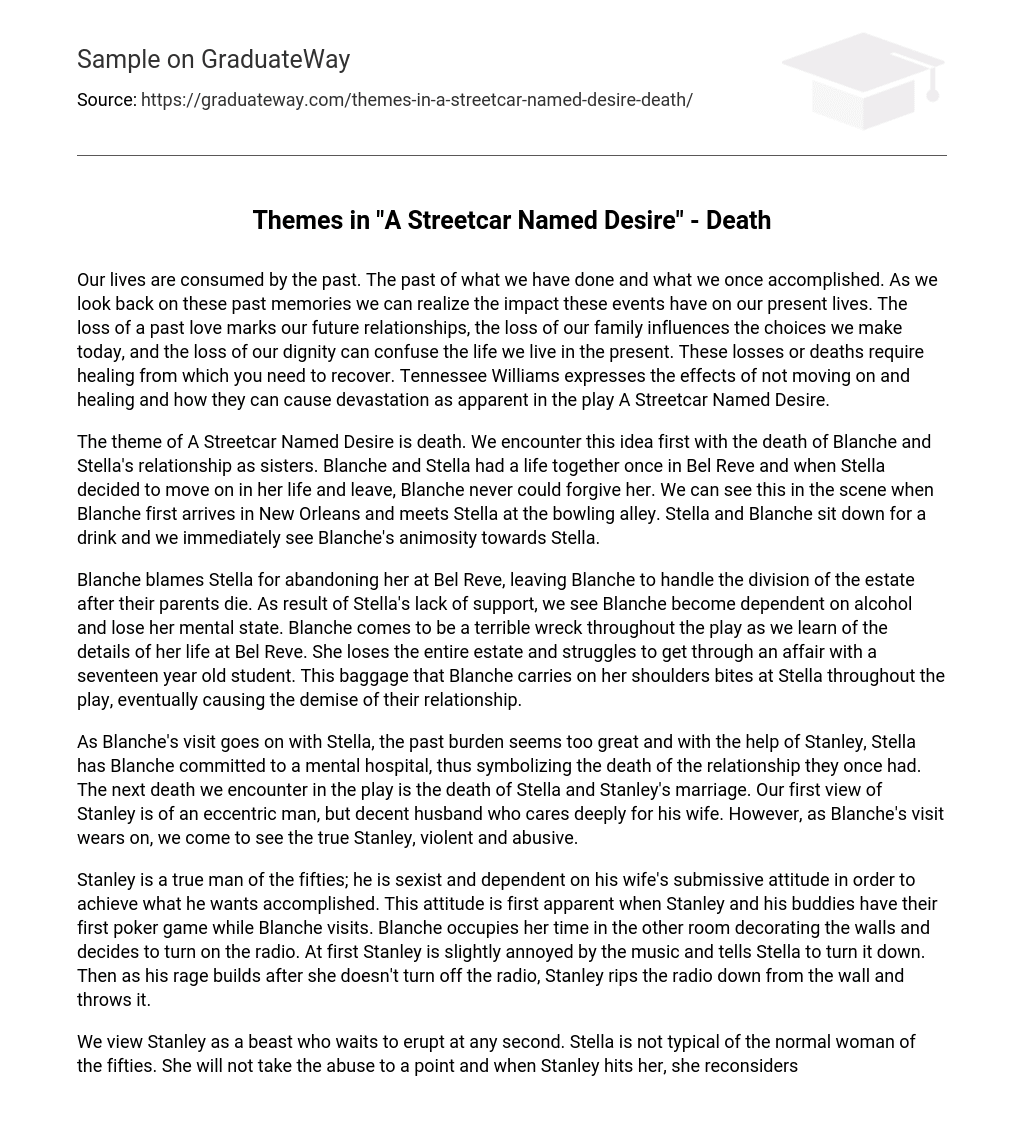Our lives are consumed by the past. The past of what we have done and what we once accomplished. As we look back on these past memories we can realize the impact these events have on our present lives. The loss of a past love marks our future relationships, the loss of our family influences the choices we make today, and the loss of our dignity can confuse the life we live in the present. These losses or deaths require healing from which you need to recover. Tennessee Williams expresses the effects of not moving on and healing and how they can cause devastation as apparent in the play A Streetcar Named Desire.
The theme of A Streetcar Named Desire is death. We encounter this idea first with the death of Blanche and Stella’s relationship as sisters. Blanche and Stella had a life together once in Bel Reve and when Stella decided to move on in her life and leave, Blanche never could forgive her. We can see this in the scene when Blanche first arrives in New Orleans and meets Stella at the bowling alley. Stella and Blanche sit down for a drink and we immediately see Blanche’s animosity towards Stella.
Blanche blames Stella for abandoning her at Bel Reve, leaving Blanche to handle the division of the estate after their parents die. As result of Stella’s lack of support, we see Blanche become dependent on alcohol and lose her mental state. Blanche comes to be a terrible wreck throughout the play as we learn of the details of her life at Bel Reve. She loses the entire estate and struggles to get through an affair with a seventeen year old student. This baggage that Blanche carries on her shoulders bites at Stella throughout the play, eventually causing the demise of their relationship.
As Blanche’s visit goes on with Stella, the past burden seems too great and with the help of Stanley, Stella has Blanche committed to a mental hospital, thus symbolizing the death of the relationship they once had. The next death we encounter in the play is the death of Stella and Stanley’s marriage. Our first view of Stanley is of an eccentric man, but decent husband who cares deeply for his wife. However, as Blanche’s visit wears on, we come to see the true Stanley, violent and abusive.
Stanley is a true man of the fifties; he is sexist and dependent on his wife’s submissive attitude in order to achieve what he wants accomplished. This attitude is first apparent when Stanley and his buddies have their first poker game while Blanche visits. Blanche occupies her time in the other room decorating the walls and decides to turn on the radio. At first Stanley is slightly annoyed by the music and tells Stella to turn it down. Then as his rage builds after she doesn’t turn off the radio, Stanley rips the radio down from the wall and throws it.
We view Stanley as a beast who waits to erupt at any second. Stella is not typical of the normal woman of the fifties. She will not take the abuse to a point and when Stanley hits her, she reconsiders her options. We again view Stanley’s rage as he yells, “Stella! Stella! “. Stella’s strength proves to be weak when she returns to Stanley arms later, however their relationship was still in trouble. Stella finally endures enough when she learns of Stanley’s abuse of Blanche and leaves Stanley in the final scene of the play; the death of their marriage.
The last main example of death in A Streetcar Named Desire is the death of Blanche and Mitch’s relationship. Death is the factor that drew the two together, the death of Blanche’s life at Bel Reve and Stanley’s dying mother. Their relationship prospered for a while as Blanche and Mitch connected, finding a common ground they could relate two. In the scene at the boat docks, we view the impact of the death of Blanche’s husband on her current relationship with Mitch. Mitch wants Blanche to the point of marriage and Blanche’s obsession with the past hinders Mitch’s plans.
This common ground proved too weak when Mitch learned of Blanche’s life at Bel Reve and her promiscuous lifestyle. When Blanche sits by the phone waiting for Mitch’s call, we view the impact of death on Blanche’s life. Blanche’s past relationships which caused so much pain where now resurfacing in Mitch. Mitch loved Blanche dearly, but could not overcome this horrible past ending with the death of their relationship and the death of Blanche’s sanity. The theme of death in A Streetcar Named Desire represents the impact of our past in our present lives.
We as individuals must resolve our past problems in order to move in a more positive direction in life. The individuals in A Streetcar Named Desire were unable to understand this idea. Blanche needed to resolve her problems in the past before she could move out of Bel Reve. Instead she fled the situation, as many of us do, and her problems followed. Stella needed to handle her problems with Blanche before she could deal with her problems with Stanley. Unfortunately, Blanche’s problems were never solved until the end of the play with her commitment to a hospital, however y that time it was too late for Stella and Stanley and thus their marriage ended. Mitch let the past of Blanche influence his love and because of his inability to overcome his personal opinions of Blanche, he never attained the love he desired. The death of Mitch and Blanche’s relationship restarts the cycle for Mitch because if he cannot handle the problems that had occurred with Blanche, he will fall into the same pit hole that she did. The past must be dealt with before anyone can move on or the consequences could be tragic, just ask Blanche, Mitch, Stella or Stanley.





